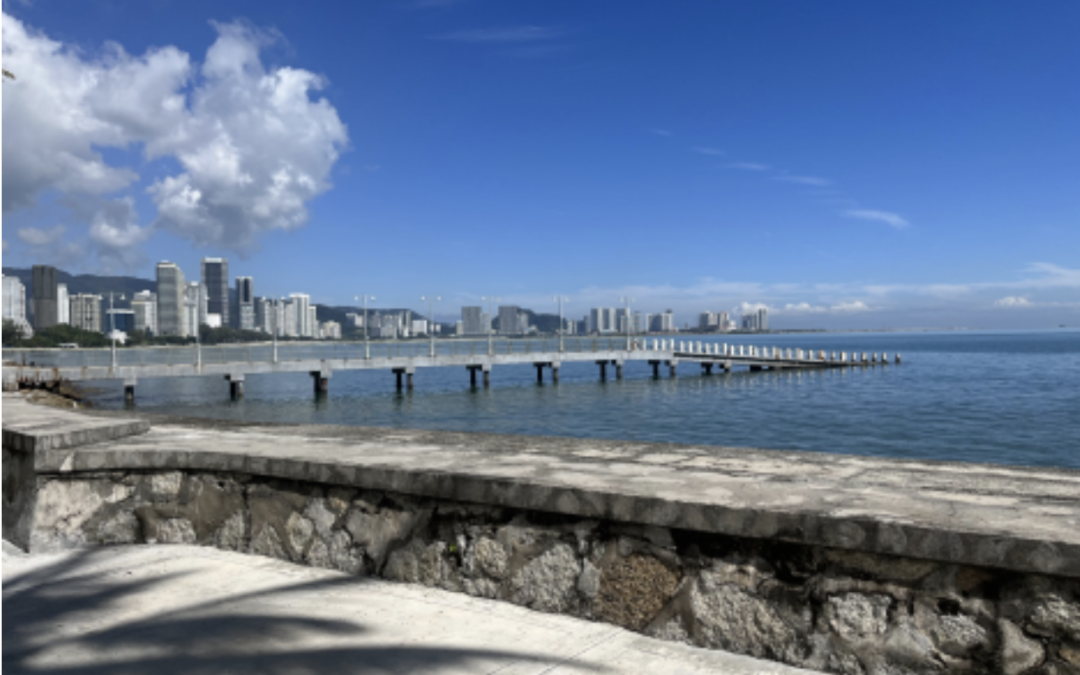Across the Pacific, on the shore of an island off the coast of Malaysia, I watched the still current calmly collide against the rocks before me. The scene was familiar; I have many memories from my childhood of being near the water. Over the years, I spent many summers visiting the Great Lakes while visiting my grandparents in Michigan. Seeing the water in front of me was a familiar feeling, but what wasn’t was what was behind me. What stood behind me was the Eastern & Oriental Hotel, a building that stood tall in all of its splendor, serving as a gateway into a pastime not yet forgotten. It was a remarkable structure, to say the least. The hotel that had once served as a vacation resort for European colonizers, voyagers, and their families was now used as a hotel/tourist attraction, promising to give all who came in a glimpse of what the past looked like. As captivating as the hotel was, what was even more remarkable was the city as a whole. Georgetown, Penang, is a city that is so diverse, complex, and rich in history that it is hard to grasp in just one stay, as is the whole of Malaysia. And though the territory was unfamiliar, it never felt daunting; instead, every step along the way felt inviting, and all the moments in between were exciting and enchanting.
In Kuala Lumpur, I was beyond impressed with the Islamic Arts Museum of Malaysia. In all of the museums I have been to in the U.S., the historical art centers around European art. This was my first time being in an art museum that focused on darker-skinned people, people who look like me. The entire theme of that museum centralizes around the Arab world. Having a view into what that world used to look like and, in a way, still does, was amazing.
The trip to Malaysia and Singapore was, without a doubt, worthwhile. It opened my mind to many new cultures and traditions I would never have experienced in the States. Additionally, it opened my eyes to the possibilities of travel and learning. Traveling abroad presents unique opportunities for students to combine intellect and critical thinking with creativity and imagination. In doing so, students can ask more profound questions, develop new ideas, and be inspired to contribute to the global community.
Traveling to unfamiliar places allows you to learn more about a particular culture through observations and experiences. One way to do this is through academic exercises like City as Text™. This exercise aims to view a city as a text that can be read and understood. It invites individuals to look beyond the surface level of their observations and explore the symbols and meanings ingrained in urban environments and the physical infrastructure. By treating the observations you make like a text that can be broken down, analyzed, and understood in multiple ways, you can better comprehend the uniqueness and complexity of these fantastic countries.
One example of a time I got to use the City as Text™ lens was when we walked by the riverfront in Kuching. While there, we went to several different shops, talked to the people—like the business owners—and asked them about their stories. We made observations about even the sidewalks of the storefronts. Outside each store, there was an area for people to sit. They had stools and chairs outside and, in a way, it was almost as if the stores were not just welcoming you to buy but welcoming you in, in general. It was creating a space for the community to come together.
In conclusion, there are many opportunities to broaden your academic horizon when traveling. By embracing the unfamiliarity of the area, you have the unique opportunity to better understand a way of life that is different from your own. While it is easy to be mesmerized and swept away by the fantastic food and tourist attractions, it is also essential to be aware of the amazingly complex environment you are surrounded by and the endless possibilities for learning. Recognizing that there is a world outside of America and that we are not the only ones living on this planet, I realized we need to deconstruct how central we identify ourselves to the world. As I reflect on my time in Malaysia and Singapore, I am thankful for the opportunity to experience new things and do so with people who were just as intellectually inclined as I was.
—Nyla Provost, Class of 2025: History and Sociology/Pre-Law

